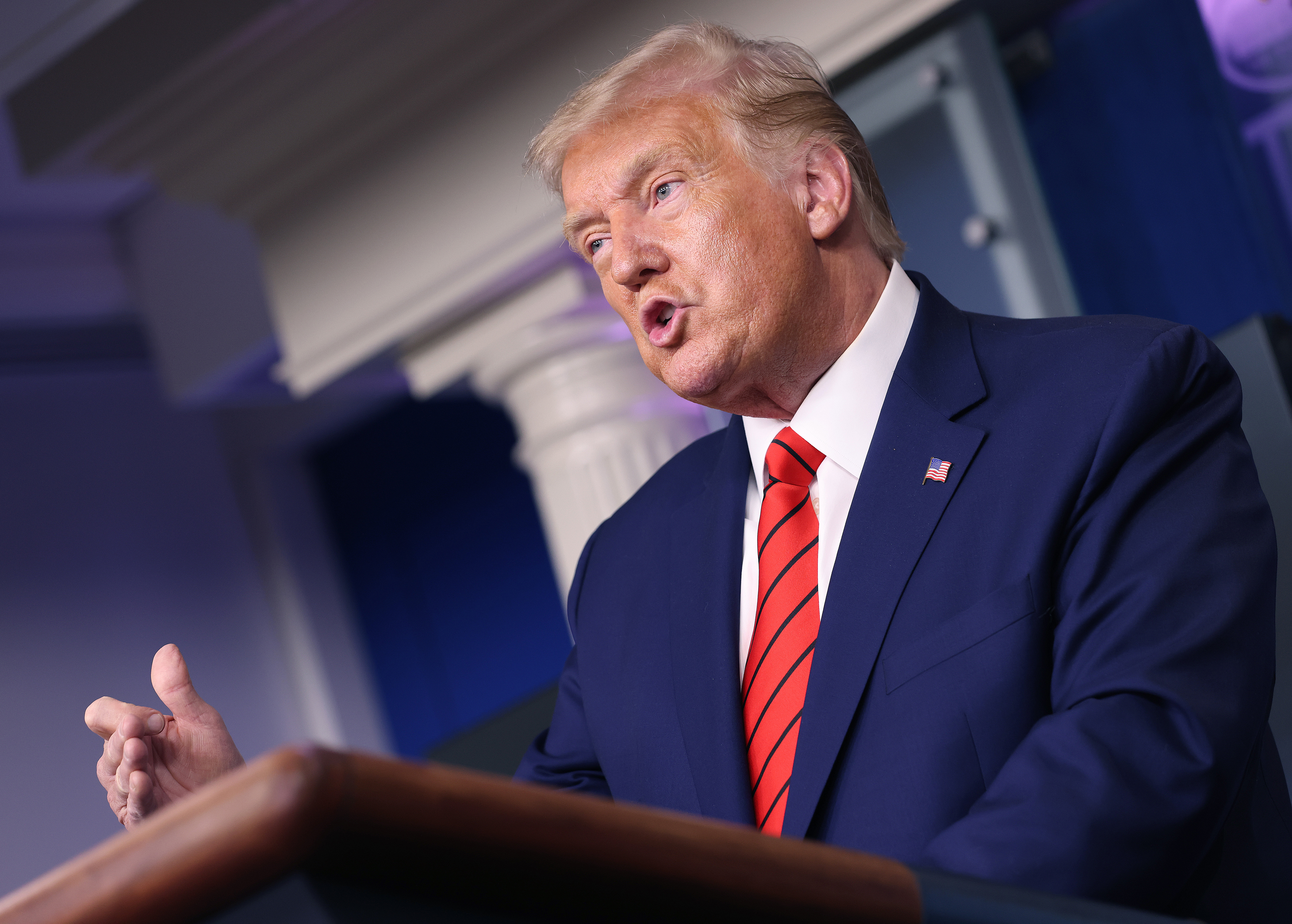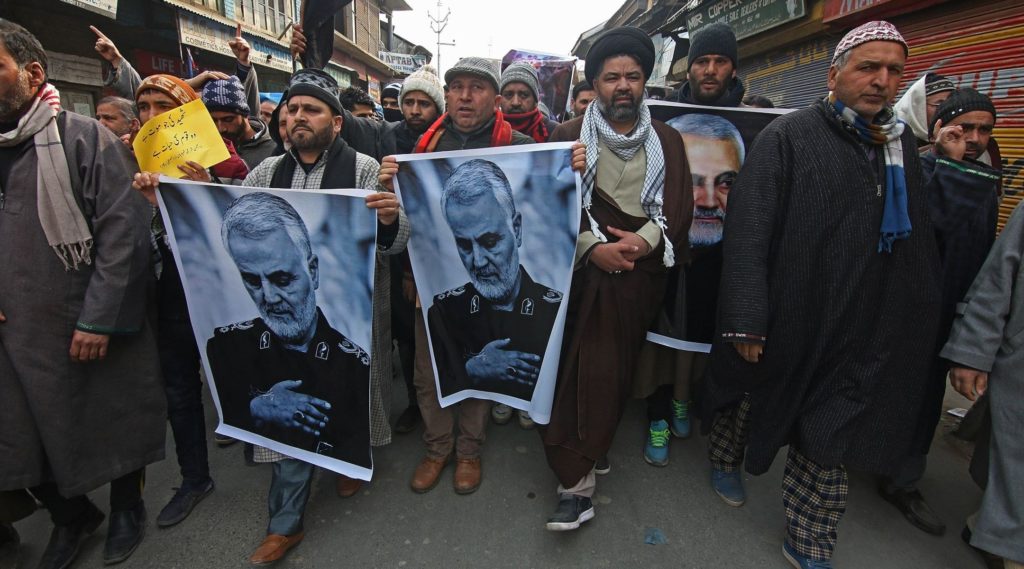 U.S. President Donald Trump speaks during a news conference in the briefing room at the White House on August 31, 2020 in Washington, DC. (Photo by Win McNamee/Getty Images)
U.S. President Donald Trump speaks during a news conference in the briefing room at the White House on August 31, 2020 in Washington, DC. (Photo by Win McNamee/Getty Images) “From today until [Donald] Trump leaves the White House is the most dangerous period for Iran.”
These were the words uttered by Mohammad-Hossein Khoshvaght, a former official at Iran’s Ministry of Culture and Guidance, in a recent Twitter post.
Apparently, the president’s lame-duck period has the ayatollahs shaking in their boots, wondering what maneuvers (and assassinations) Trump will greenlight as final parting gifts to Israel and anyone who has a stake in curbing Iran’s violent hegemony and keeping nuclear weapons out of the hands of the regime.
Last month, The New York Times reported that Israel, at the behest of the United States, killed Abdullah Ahmed Abdullah, al-Qaeda’s second-in-command, on August 7 in Tehran. Abdullah, who went by the nom de guerre Abu Muhammad al-Masri, had long been on the FBI’s Most Wanted Terrorists list. He was one of the masterminds behind the deadly attacks in 1998 against American embassies in Kenya and Tanzania that killed 244 people.

On the anniversary of the embassy bombings, al-Masri was killed alongside his daughter, Miriam, the widow of one of Osama bin Laden’s sons. If you’re wondering what such unsavory people were doing in Iran, you’re not alone.
The assassination was an embarrassing blow to Iran. Why was the world’s biggest Shiite state — which demands international recognition (and since the election of Joe Biden, has released a list of compensation demands to bounce back from Trump’s “maximum pressure” campaign) — allowing a founder of al-Qaeda, a Sunni terrorist organization, to live in Tehran, under the protection of both the Islamic Revolutionary Guard Corps (IRGC) and the Ministry of Intelligence and Security?
Aren’t Iran and al Qaeda enemies?
Not when it comes to fighting Israel and the United States. According to American intelligence sources, al-Masri had been in Iran since 2003 and moved to the upscale Pasdaran district of Tehran in 2015.
That means that when former President George W. Bush was waging a “war on terror” in Iraq and Afghanistan nearly two decades ago, al-Qaeda’s No. 2 was living comfortably in Iran.
Al-Masri may have been assassinated in Tehran, but the biggest psychological blow to the regime in 2020 occurred on January 3, when General Qassem Soleimani, leader of the Quds Force (a division of the IRGC), was killed at Baghdad International Airport in a precision strike from an American drone. The strike also killed Abu Mahdi al-Muhandis, an Iraqi who commanded the Iranian-backed Kataib Hezbollah group.
No one could believe that Soleimani had been killed. And there were many who jumped at the chance to condemn Trump and the attack, most notably Democratic presidential candidates, including Elizabeth Warren, who said, “Donald Trump has lost all credibility with the American people, and he’s lost all credibility around the world,” and Biden, who stated, “As someone who has spent his whole life involved in national security and foreign policy, I never thought that I’d see something quite like this.”

The first eight months of 2020 saw the killing of the second most powerful man in Iran (after Supreme Leader Ayatollah Ali Khamenei) and the second-in-command of al-Qaeda, who was enjoying life in Iran. The first attack was carried out by the United States; the second was at its request.
But that wasn’t all.
This year also saw a string of Israeli sabotage attacks against Iranian nuclear facilities. So many, in fact, that it was all but impossible for the regime to evade the psychological blows of one unforeseen strike after another. In simple terms, their nerves were shattered.
And then, the chief architect of Iran’s nuclear program was assassinated.
On November 27, Mohsen Fakrizadeh was killed in Absard, a small city near Tehran. Initial reports said Fakrizadeh was killed by 12 operatives who ambushed his vehicle, but Iranian authorities are now claiming the attack was carried out by a remote-controlled weapon.
The European Union was quick to condemn the killing. Former officials of the Barack Obama administration joined the chorus, too, and former CIA director John Brennan said that if a foreign government was responsible for the attack, it would constitute “an act of state-sponsored terrorism.”
That’s deeply ironic, given that Iran is the world’s biggest and most homicidal perpetrator of state-sponsored terrorism.
Israel has not officially commented on the assassination, although it’s widely believed that it carried out the attack. That’s no surprise.
In 2018, Israeli Prime Minister Benjamin Netanyahu publicly called out Iran during a widely-broadcast press conference by showing detailed Iranian plans for a nuclear weapon — plans which Israeli operatives had snuck out of Iran in a daring raid. During that press conference, Netanyahu said, “Remember that name, Fakrizadeh.”
Did the United States know about Israel’s intent to target Fakrizadeh? It’s hard to tell. We know that in the past, Israel has informed the U.S. about attacks and operations in advance. And just two weeks before Fakrizadeh’s assassination, Secretary of State Mike Pompeo visited Israel, Saudi Arabia, the United Arab Emirates and Bahrain. The main topic of discussion during his regional tour? Iran.
There are many questions related to the blows the regime has suffered this year: It’s been almost a year since Soleimani was killed. Will Iranian leaders ever seek revenge against his death? There’s a critical power struggle in Iran between fanatic hardliners and slightly-less fanatic “moderates.” Will Fakrizadeh’s killing embolden Iranian hardliners, who will make it all but impossible for the United States and Iran to renew the terms of the 2015 Joint Comprehensive Plan of Action (JCPOA), otherwise known as the “Iran Deal”?
For now, I’m more concerned about one nagging question: Will Israel (and the United States) take any further steps to render Iran’s nuclear ambitions impotent before Biden succeeds Trump as president?
Such are anyone’s questions about the parting gifts of a president who, just weeks after losing the election, convened his closest advisors in the Oval Office and asked if he should launch a military strike against Iran’s main nuclear site. Those advisors, including Vice President Mike Pence, General Mark Milley, Chairman of the Joint Chiefs of Staff, and Pompeo, all advised the president against attacking Iran, citing concerns over the escalation of conflict in the region.
Destroying Iran’s main nuclear site just weeks before leaving the presidency? A potential parting gift, indeed.
But Trump knows better. And yet, he doesn’t know everything.
Back in January, when Trump authorized the assassination of Soleimani, he probably imagined a second term in office. And as soon as Soleimani was killed, American officials began anticipating a violent Iranian response. That response, they now fear, might occur on January 3, 2021, the one-year anniversary of the assassination.
But there’s just one problem: As much as Iran wants to retaliate, its angry hands are tied. If Trump had been re-elected, Iran would most likely have planned an attack, possibly against American forces in the region, this coming January.
As much as Iran wants to retaliate, its angry hands are tied.
But Biden won the election. And attacking Americans just weeks before the inauguration of a president who has stated his intentions to renew the Iran nuclear deal would be a profoundly witless mistake. It’s precisely this conundrum that will leave Iran unable to harm Americans in retaliation for Soleimani’s assassination.
Unbeknownst to him, that may have been one of Trump’s most important parting gifts of all.
Tabby Refael is a Los Angeles-based writer, speaker and activist.























 More news and opinions than at a Shabbat dinner, right in your inbox.
More news and opinions than at a Shabbat dinner, right in your inbox.